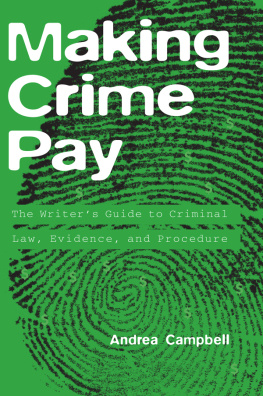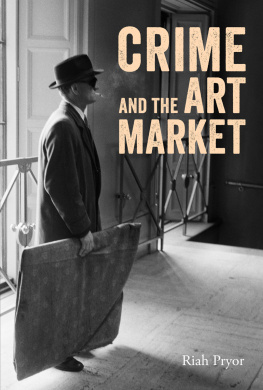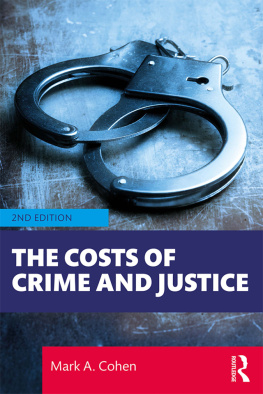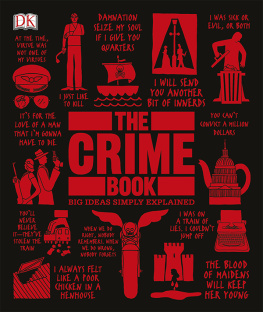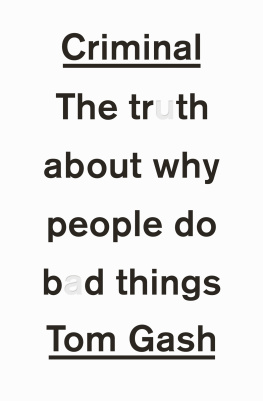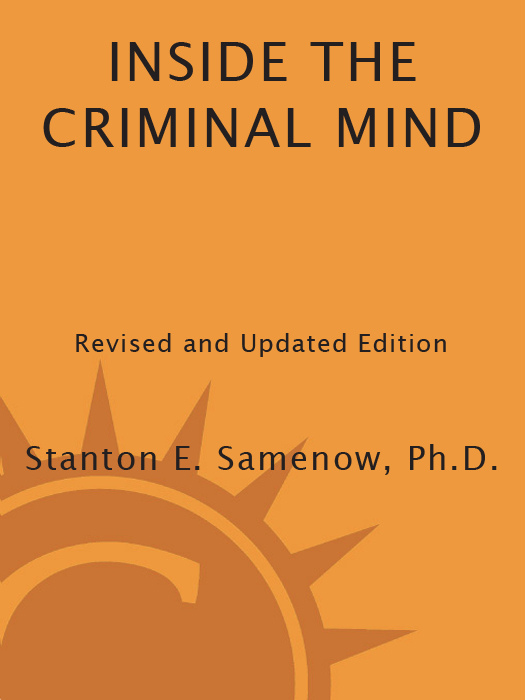A LSO BY S TANTON E. S AMENOW
Straight Talk About Criminals
Before Its Too Late
In the Best Interest of the Child
With Samuel Yochelson, M.D.
The Criminal Personality: Profile for Change
The Criminal Personality: The Change Process
The Criminal Personality: The Drug User
Videotape Series and Workbooks by Stanton E. Samenow
Commitment to Change: Overcoming Errors in Thinking
Commitment to Change: Tactics
Commitment to Change: The Power of Consequences
Copyright 1984, 2004 by Stanton E. Samenow
All rights reserved. No part of this book may be reproduced or transmitted in any form or by any means, electronic or mechanical, including photocopying, recording, or by any information storage and retrieval system, without permission in writing from the publisher.
Published by Crown Publishers, New York, New York.
Member of the Crown Publishing Group, a division of Random House, Inc.
www.crownpublishing.com
CROWN is a trademark and the Crown colophon is a registered trademark of Random House, Inc.
Originally published in slightly different form by Times Books, a division of Random House, Inc., in 1984.
Library of Congress Cataloging-in-Publication Data
Samenow, Stanton E., 1941
Inside the criminal mind / Stanton E. SamenowRev. and updated.
1. Criminal psychology. 2. Juvenile delinquentsPsychology. 3. Conduct disorders in adolescence. I. Title.
HV6080.S22 2004
364.3019dc22 2003019505
eISBN: 978-0-307-39410-1
v3.1
In memory of Dr. Samuel Yochelson,
who taught and inspired me so many years ago.
A CKNOWLEDGMENTS
I thank Ed Schuman and Richard Stromberg
for reading the manuscript and making excellent suggestions.
C ONTENTS
.
T HE B ASIC M YTHS A BOUT C RIMINALS
.
P ARENTS D ONT T URN C HILDREN INTO C RIMINALS
.
P EER P RESSURE: N O E XCUSE FOR C RIME
.
T HE H ELL WITH S CHOOL
.
W ORK AND THE C RIMINAL
.
P EOPLE AS P AWNS
.
U LTIMATE C ONTROL: C RIMES OF V IOLENCE
.
I TS T HUGS , N OT D RUGS ; I TS T HINKING , N OT D RINKING
.
G ETTING O VER ON THE S HRINKS
.
L OCKED U P
.
T HE C RIMINAL AS T ERRORIST : I MPLICATIONS FOR I NTERNATIONAL T ERRORISM
.
T HE C RIMINALS S ELF -I MAGE : D ECENT P EOPLE
.
T HE T OTAL F AILURE OF THE C ONVENTIONAL W ISDOM
.
C OPING WITH C RIMINALS : D USTY T RAILS AND D EAD E NDS
.
T O C HANGE A C RIMINAL
.
H ABILITATION OR M ORE C RIME ?
A C AUTION TO THE R EADER
IN MY EARLIER writings, I received the following criticism. Readers understood the characteristics of the criminal that I described in detail. However, some developed a case of medical students disease. That is, they saw themselves in what they were reading. Thus they thought, Gee, my wife does some of these things. My son does, too. For that matter, so do I. Am I a criminal by Samenows definition? It is true that we all have lied at times. We have hurt other people, if not deliberately, then by displaying insensitivity. We have become angry when we felt mistreated or when a situation did not meet our expectations. Occasionally, we have put off an obligation inconveniencing or hurting others. And so forth. So it is understandable that one might ask whether I am stating or insinuating that anyone who is irresponsible is a criminal. In fact, a reviewer of the 1984 edition of Inside the Criminal Mind wondered whether my description of criminality didnt embrace most of the population.
Another issue that arose in some readers minds was the following: One can reasonably argue that the definition of criminality depends on whether an individual violates a law. And laws change. A person might engage in behavior that is considered a crime in one state but not in another. Even within the same jurisdiction, laws change. Marijuana use might be against the law today but not tomorrow. Thus the argument is that criminality is relative to place and time.
If I was not clear before, now is the time to address these issues. My work during the past thirty-four years does not deal just with violations of laws. It focuses on the minds of human beings and how they live. There are people who would be criminals no matter where they live. These are individuals for whom to be someone in life is to do the forbidden, whatever the forbidden might be. One man said that if rape were legalized, he wouldnt do it, but he declared that he would certainly do something else that was just as exciting and forbidden. The criminal thirsts for excitement and a buildup at the expense of others. No matter what the laws, mores, and customs of a particular society are, he will violate them and leave a trail of injury behind.
Lets talk about whether, by my framework, we are all criminals. Lets do this by looking at several aspects of the criminal mind. Responsible people occasionally lie to spare themselves embarrassment or to show themselves in a favorable light. There are the lies that grease the wheels of social interactions. I might ask whether you like the tie I am wearing. You might think it is hideous but reply that it is good looking because you dont want to hurt my feelings. I submit that there is a major difference between the person who tells an occasional lie and an individual who lies as a way of life. The criminal lies to cover his tracks (he has a lot to conceal) and to get out of a jam that he has created for himself. However, he also lies about the most minuscule matters even when there is no ostensible reason. Hell say that he went to one store when he really went to another. Some people in the mental health field will conclude that this is pathological or compulsive. This is not the case. The lie that makes no sense does make sense when you understand the mentality of the liar. The criminal lies in order to preserve a view of himself and the world. He derives a sense of power from lying, in believing he is pulling the wool over the eyes of others.
The same is true with the other characteristics. They exist along a continuum, just like lying. For example, at times we put off meeting obligations or ignore them completely. Others are harmed by this behavior. The criminal has no concept of obligation! Everything is about himwhat he wants and when he wants it. Failing to put himself in the place of others except for the most self-serving purposes, the criminal constantly defaults on obligations because he doesnt recognize that he has them to begin with.
Occasionally, we have hurt other people inadvertently or perhaps out of vindictiveness. Usually, we have regrets. The criminal leaves carnage in his wake as he pursues the excitement and the power and control that he constantly craves. To him, injury is leaving a person lying in a pool of blood. He has no idea of the physical, financial, and emotional impact on his immediate victims and the ripple effect on others. No matter how many victims he has and how much damage he does, the criminal has little, if any, remorse and continues to regard himself as a good person.
As you read Inside the Criminal Mind, it is important to bear in mind that, as with so much else in life, the characteristics described exist by degree. Thus, there is a spectrumfrom the person who rarely engages in the thinking and behavior being cited to the individual for whom that thinking and behavior has become part of his way of life. If a man, woman, or youngster is extreme in all the characteristics I am describing, the whole is greater than the sum of the parts. The result is a human being who holds a radically different view of himself and the world from a person who lives a basically responsible life.



